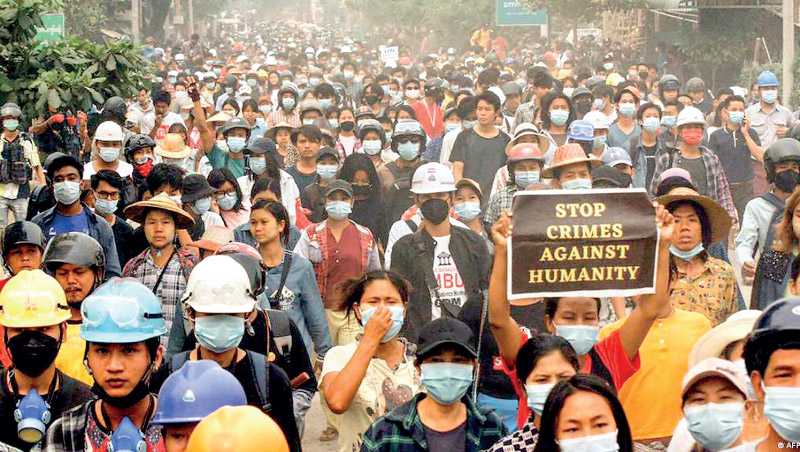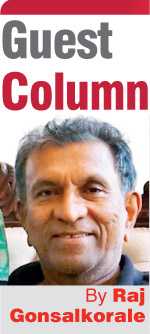Monday Feb 16, 2026
Monday Feb 16, 2026
Thursday, 1 April 2021 00:15 - - {{hitsCtrl.values.hits}}

The UNHRC and the West, so concerned about the ants, look totally disinterested when the military in Myanmar mows down innocent civilians fighting for their human rights. Military might has replaced human rights and the world looks on issuing useless statements from UN pulpits. The duplicity and differential treatment being meted out is sickening
Yet it remains the case that if Nigerian public and private sector players doing business with the Chinese elephant could improve their negotiating skills and be more ambitious about their negotiating positions, making better use of Nigeria’s ‘superpower’ qualities to minimise the drawbacks of its antlike ones, the future of Nigeria-China relations could be brighter and more beneficial for Nigeria than their past – South African Institute of International Affairs
 Human rights violations allegedly committed by President Gotabaya Rajapaksa and the Government of Sri Lanka are antlike compared to the elephantine violations committed by giants in the world including the USA.
Human rights violations allegedly committed by President Gotabaya Rajapaksa and the Government of Sri Lanka are antlike compared to the elephantine violations committed by giants in the world including the USA.
The UNHRC and the West, so concerned about the ants, look totally disinterested when the military in Myanmar mows down innocent civilians fighting for their human rights. They have not raised a finger or even a fingernail to do anything tangible to halt the military juggernaut from killing more people and subjugating them to the power of guns and other military hardware. Military might has replaced human rights and the world looks on issuing useless statements from UN pulpits. The duplicity and differential treatment being meted out is sickening.
Yet, these human rights champions are concerned about internal matters of Sri Lanka, but not concerned about the Muslim extremists who killed more than 300 people during the Easter bombings in 2019 and prior to that the marauding LTTE who killed hundreds and thousands of innocent children, women, old men and women. The dark history of the LTTE has been inconsequential for the UNHRC or the West.
Much has been written about the plight of the poor in the US who have no rights if they are poor. The world knows how rights are violated in Saudi Arabia, protected by the US. They know about the violations in Israel, again protected by the US. Palestinians have been trampled, walls built around them, and basic living conditions denied to them.
Some of the member countries of the UNHRC which voted against Sri Lanka have appalling human rights records. Some others who sat on the fence too would not have a place to hide if their records are exposed. Others who sat on the fence did not have the guts to either side with the elephants or support the ant who was being trampled.
Sections of the Tamil diaspora, the beggars with the wound that will never heal, provided plenty of falsehoods to the core group and the US, and the world media big shots sponsored the case against Sri Lanka basing their accusations on such falsehoods, and also infringing on Sri Lanka’s sovereignty as if Sri Lanka was still one of their colonial outposts.
It is high time Sri Lankan Tamils who wish to call Sri Lanka their home divorced themselves from the LTTE and their supporters overseas, and also kicked out their politicians from their electorates and elected a set of politicians who would help to develop their areas and improved their lot.
They must ask themselves what these politicians have done for them since independence. They must ask themselves what development support the Tamil diaspora, barring a handful, have done to improve the economic wellbeing of Tamils in the north and the east by investing, and creating jobs or improving agriculture and agri industries so that people would have had more self-employment opportunities. Had they done this, the private sector in the north and east would have been booming today.
Instead they contribute to fill the coffers of the LTTE rump, who in turn puts money in the pockets of politicians in the West to continue their fake allegations about their “hopeless” fate in Sri Lanka. This money goes to keep LTTE atrocities under the lid and make the world think that the LTTE was a lily white set of freedom fighters without any blemish.
The current President Gotabaya Rajapaksa may have his faults. After all he is human. But, few seem to remember that had it not been for him and the service commanders at the time including Field Marshal Sarath Fonseka, who led very brave Forces personnel, and the political leadership provided by President Mahinda Rajapaksa, the island of Sri Lanka would have had two nations by now. There are of course those with short memories, who owe their freedom to talk, write and act because the LTTE were defeated militarily in 2009, and others with an objective that is still uppermost in their minds, and that is to create a separate nation in the north and the east.
Tamil people will have to make a decision whether they wish to be in one nation called Sri Lanka, along with the Sinhalese, Muslims and other ethnic groups, or whether they wish to live in a separate Nation. Such a decision however cannot be just the decision of Tamil people, it has to be a decision of all people of Sri Lanka including the Sinhalese, Muslims and other races, as they all have ownership of the one country and island where everyone lives.
If the Tamil people in the north and east and others living in the rest of the country wish to advance and work towards the concept of one country for all, they have to choose a different set of leaders who would pursue such a concept and work towards addressing how the road blocks that might be impeding the one country concept may be overcome. It has to be clear to the Tamil people that their leadership has failed them, and they have not benefited by the divisive politics practiced by their leadership. Solutions lie in compromise and consensus decision making by all people as no group could have aspirations that disadvantage another group. In particular, majority groups need to compromise more than minority groups as majorities can and they do create imbalances simply on account of their numerical strength.
Muslim people of Sri Lanka too need to make a decision about their future in Sri Lanka and whether they wish to replicate extremism practiced in countries like Saudi Arabia or whether they wish to practice moderation as the Prophet himself articulated very well in his teachings. Extremism cannot have a place in the country. Politicians who advocate extremist ideologies should be rejected by the Muslim people.
The UNHRC vote gave a clear indication as to who were with Sri Lanka and who had the self-respect to defend their sovereignty as this resolution was clearly aimed at infringing on the sovereignty of small, poor and developing nations by those powerful ones who had become the pseudo defenders of human rights. In saying this, there is no inference whatsoever that any violation of people’s human rights should not be opposed. It must be. However, such a condemnation has to be proportionate to the alleged or actual violations, and also dealt in equal measure irrespective of a country’s wealth or power. This is not the case today as evidenced by how the rich and the powerful treat some nations differently to others.
The Nigerian simile mentioned at the outset of this article rings true when it comes to Sri Lanka too. China is the elephant in the room which has got the Western power bloc which includes India, to take measures against Sri Lanka and corral it using a UNHRC resolution, hoping that Sri Lanka will yield to such international pressure and cave into their demands.
Despite the uphill task, Sri Lanka should not cave in as that would be the end of the country’s sovereignty. Sri Lanka should however very aggressively and purposefully pursue alliances with countries in similar situations to counter the threats from not just the Western power bloc, but even from China at a future point in time. A very aggressive China, pursuing its own agenda of being the next super power of the world, could potentially become the elephant that tramples nations like Sri Lanka if it felt that an ant was standing in its way.
Sri Lanka no doubt wants and must have the support of all nations to improve their economic and social wellbeing of their people. It needs investments from all corners and not loans and handouts. Sri Lanka’s development and self-sufficiency has to come from the confidence it generates to attract investments. In this regard, many initiatives being taken by the Rajapaksa Government have to be lauded and encouraged, while those opposed to the Government should offer constructive criticism of Government policies and practices. A democratic opposition should not resort to spreading fake news to pursue a genuine political agenda unless that agenda is also as fake as the fake news.